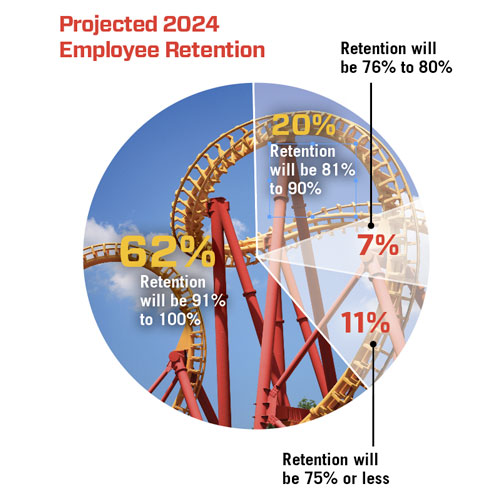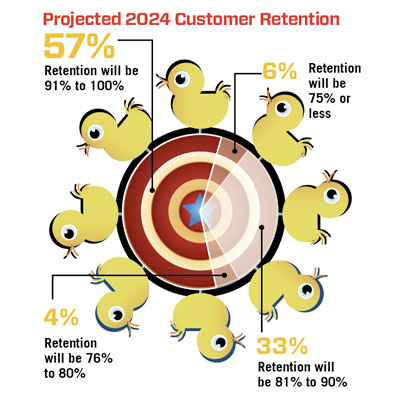
Photo: Manu/iStock / Getty Images Plus/Getty Images
Pest management professionals (PMPs) who answered our 2024 State of the Industry survey shared the reasons for their employee and customer retention challenges, and many offered similar responses.
The economy is having an impact on customer retention, as increasing costs for housing, fuel and food leave households and businesses little money for pest control services. Of course, PMPs already know that eliminating pest control is a mistake, as most pests will stick around until professional control measures are implemented.
“With inflation a concern for many people, money will continue to be tight,” says Kent Smith, owner of A+ Quality Pest Control in Oskaloosa, Iowa. “The pests will still be there, but customers will be looking to obtain effective services for their money.”
The main attraction
Despite the economy, Smith plans on 10 percent to 15 percent growth in 2024. “As long as you provide a quality service, there will always be a need for your services,” he adds.
PMPs get the business by conveying the value of their pest control services. Honor Services’ director of pest prevention, Jacob Morehouse, strives to educate customers about the services his Melbourne, Fla.-based company offers.
“I endeavor to educate customers, spend time with them, and make sure to be transparent,” he explains. “This may take quite
a few reminders, documenting these conversations, and even taking pictures of conducive conditions the customers may be able to remedy.”
Letting customers know pest control is a team effort helps prevent complaints, which are nothing new to service industries such as pest control. But that’s not the reason Morehouse takes the time to explain the process. “I do this because I want people to be educated about pest control. There are so many misunderstandings and so much misinformation about our industry,” Morehouse says. “I want to clear these up for as many as I can, even if it is just one customer at a time.”
Workers wanted
Finding reliable employees who will take the time to provide exemplary customer service has been a challenge for many of the PMPs who answered our survey. But PMPs are finding ways to beat the odds.
Dan Fleischer, owner of Pestex Inc. in Framingham, Mass., says hiring employees is his biggest impediment to growth. With 17 technicians, he seeks honest, hard-working candidates who are looking for careers, not just jobs. The company has made adjustments to attract workers, including offering flexible hours and four-day workweeks.
“We prefer people with no experience because we hire for attitude and train for technique,” he says. “I can train someone on rodent control, but not to be on time, and I can’t train someone to be nice and respectful.”
Slug-A-Bug’s Pest Division Training Manager Randy Darrah also seeks workers interested in staying on, and shares advice that works for the Melbourne, Fla.-based company. Continually training employees is key, but that’s not all.
“Hire employees with the same values as your company, and empower them to make decisions in the field,” he says. “These two strategies have a tendency to make teammates feel they belong, and usually results in long-term employment.”
Training is key for Giancarlo Fernandez as well. The president of Solaris Pest Solutions in Santa Clarita, Calif., says he tends to hire employees who are able to follow a detailed training program.
“Referrals from current employees are the best,” he notes. “Recognition of the employees’ efforts and accomplishments makes for a good working environment.”
Rakshit Advani, BCE, offers advice for recruiting and retaining all-star employees. The VP of Elmhurst, N.Y.-based Pest Management Sciences recommends creating clear job descriptions, and investing in ongoing development and networking opportunities.
While offering competitive compensation and good benefits will help attract potential employees, it will take more than that to keep workers happy and eager to please customers.
“Listen to your employees,” advises Joe LaTour, manager of Hunts Quality Pest Control in Queensbury, N.Y. “Use their mistakes as an opportunity to teach them, as well as acknowledge what they’re doing right.”

Photo: DougLemke/iStock / Getty Images Plus

Photo: Getty Images: digitallead/ DigitalVision Vectors
Leave A Comment